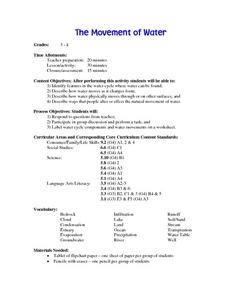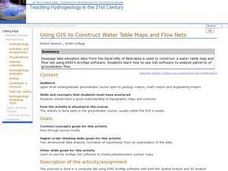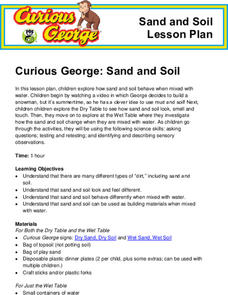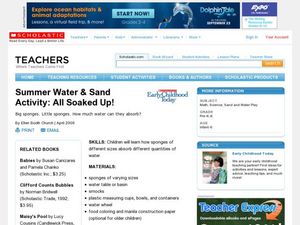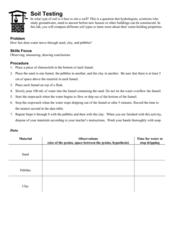Curated OER
Water Table Lab
Young scholars build a water table to show the zones of aeration and the zones of saturation. In this water table lesson plan, students use a beaker with sand and gravel to simulate the Earth's water table. They label the zones of...
San Francisco Public Utilities Commission
What is Groundwater? Our Underground Water Supply
Learn about the consequences of groundwater with a lesson about the different ways California handles water conservation and pollution. After reading a passage about the water table, learners apply what they have read to six...
Curated OER
The Movement of Water
Here is an excellent lesson plan on the water cycle and the states in which water exists. Learners identify the features of the water cycle, describe how water changes form, and look at ways that people affect the natural movement of...
Curated OER
Using GIS to Construct Water Table Maps and Flow Nets
Students examine how to use GIS software to analyze patterns of groundwater flow. Seepage lake elevation data from the Sand Hills of Nebraska is used to construct a water table map and flow net using Esri's Arc Map software.
Curated OER
Sand & Water: Arctic in the Sun
Students chill out on a hot day with this outdoor activity. In this early childhood physical education lesson, students have fun experimenting through play with ice and toy animals in water.
PBS
Curious George: Sand and Soil
Two sensory tables—wet and dry—allow scholars to use their sense of sight, touch, and smell to observe the changes when the dirt mixes with water. A short video relates the STEM learning experience to a fun video clip where Curious...
Curated OER
Water Table
Students study the meaning of a water table and how it contributes to the existence of streams, swamps, and lakes in Nebraska. They conduct an experiment and complete a diagram of the hydrologic cycle.
Curated OER
How Does Water Cool?
How fast does water cool? First fifth graders will draw a line on a graph that predicts how fast they think water can cool from boiling. Then they plot the actual data on the same graph to see if their estimate was correct.
Curated OER
Summer Water & Sand Activity: All Soaked Up!
In this lesson, Summer Water & Sand Activity: All Soaked Up!, students experiment with sponges and water. Students analyze how sponges absorb water. Students learn a song to sing during the lesson to help them understand the water...
Curated OER
Groundwater Lab
In this groundwater activity, learners simulate a pumping well and a pumping well near an injection well using plastic bottles and dirt. They use food coloring to act as a contaminate to see the movement of food color into the water....
Curated OER
Water Speed and Erosion
Fourth graders investigate the process of water erosion. They observe the roots of a plant and discuss the concept of erosion. Next, in small groups they conduct an experiment to observe how water erodes soil on a stream table, and...
Curated OER
Soil Testing
Earth science learners experiment with the water-holding properties of sand, pebbles, and clay. They apply their findings to the building of a well. This activity is engaging and tactile, and it demonstrates the importance of considering...
Curated OER
Sand and Water
Young scholars follow this recipe for fun clay creations. For this early childhood art and science lesson, students develop creative-thinking skills, fine-motor skills, and sensory awareness while they make, mold, and decorate salt dough.
Safe Drinking Water Foundation
To Filter or Not to Filter
Drinking clean water can be taken for granted. Explore the process and high cost of filtering water with a water pollution and filtration activity. Young scientist build a filtration system to filter polluted water, examine the economics...
Curated OER
Cleaning Water: How Filters Work
Students construct their own water filter to obtain clean water. In this filtration instructional activity, students produce tainted water in order to properly filter it with filtration devices made in class.
Rivanna Regional Stormwater Education Partnership
Does It Soak Right In?
Which materials are best for groundwater runoff, and which are best for percolation? Discuss the water table with several experiments about different types of soil, pollution, precipitation, and filtration. The experiments assign roles...
Curated OER
Model of a Well
Learners complete an experiment using wire screening, wires, water, sand, and food coloring to compare the relationship of groundwater to wells. For this water lesson plan, students observe and record what they see after they complete...
Curated OER
Water: Naturally Cleaned
Learners use stream trays covered in different types of rocks or soil to investigate infiltrates and runoff. In this water pollution lesson, students work in groups with stream trays that have different substrates. They write a paragraph...
Curated OER
Who Dirtied The Water/Clean Water: Is It Drinkable?
Students enter the room, receive a film canister that contains materials that be added to the dirty water bell jar. They record on their data table who or what is doing the adding and the actual substance that has been added to the bell...
Rivanna Regional Stormwater Education Partnership
Invisible Passengers
How does water pollution affect the organisms living in the water? Use three science experiments to examine how erosion and other pollutants can affect water quality. Each experiment focuses on a different aspect of pollution and...
Curated OER
Water Table
Learners predict from a rock sample whether a water well could be drilled in that type of rock. They predict what conditons would be necessary for the well to produce water.
Curated OER
Water Paintings
Students use water to paint pictures outdoors. In this water painting activity, students paint pavement and observe how water evaporates. They compare painting in sunny versus shady locations. They also use sponges to observe the...
Curated OER
What's The Level?
Pupils examine the movement of the water table and saturation zones. They describe the movements of the water table and locate the saturation zones. Students identify the function of each saturation zone. They develop a model of the...
Curated OER
Soil Water Worksheet #1
Drawings of four groups of soil particles of varying sizes are displayed across the page for soil scientists to examine. As they complete the worksheet, place a set of similar soils at each table for hands-on experience. In this way,...




